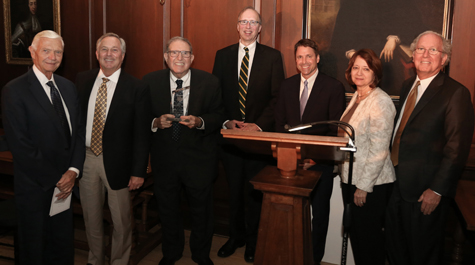Professor Steven J. Eagle Awarded Annual Brigham-Kanner Property Rights Prize
“A very strong bridge between the academy and the practicing bar.”
That’s how Lynda Butler describes Professor Steven J. Eagle, Professor Emeritus of Law at George Mason University’s Antonin Scalia Law School.
Butler, the Chancellor Professor of Law and director of the Property Rights Project at William & Mary Law School, honored Eagle with the 2019 Brigham-Kanner Property Rights Prize during the 16th annual Brigham-Kanner Property Rights Conference. Held at William & Mary on Oct. 3-4, the conference brought together members of the bench, bar and academia to explore recent developments in the law that affect property rights.
The Brigham-Kanner Property Rights Prize is named in honor of the lifetime contributions of Toby Prince Brigham, founding partner of Brigham Moore, LLP, and Gideon Kanner, professor of law emeritus at Loyola Law School in Los Angeles. It is presented annually to a scholar, practitioner or jurist whose work affirms the fundamental importance of property rights.
Referring to Eagle as “one of our most committed property scholars,” Butler observed that Eagle fit the bill perfectly.
“By committed, I mean his prolificacy as a writer and his willingness to tackle property rights issues totally and completely, no matter how difficult the issue or how muddy the field,” Butler said. “Steve’s numerous publications address such topics as environmental regulations, affordable housing, telecom and energy siting matters, and, of course, every aspect of regulatory takings.”
A member of the American Law Institute and a Fellow of the American College of Real Estate Lawyers, Eagle has served the legal profession as well, in significant ways. He has testified before Congress and held a number of leadership positions in the ABA, including as an advisor to the National Conference of Commissioners of Uniform State Laws.
Eagle earned his bachelor of business administration from the City College of New York in 1965 and his juris doctorate from Yale Law School in 1970. He taught at the law schools of Vanderbilt University, the University of Toledo, and Pace University before joining George Mason University in 1987. He taught the first-year course, Property, Land Use Planning, and an advanced constitutional law seminar on property rights.
With his work in regulatory takings and other aspects of property law, Eagle plays an important role in the ongoing dialogue among American legal scholars, lawyers and judges on the meaning of constitutionally protected property rights. He is the author of a leading treatise on regulatory takings as well as numerous scholarly and popular articles, and teaches in programs for judges and the practicing bar.
The Brigham-Kanner Property Rights Conference is renowned for its outstanding panel discussions and for bringing together the bench, bar and academics on its panels. Founded by William & Mary Law School alumnus Joseph T. Waldo ’78 during the Campaign for William & Mary (2000-07), the conference is notable for its encouragement of active participation from the audience through its question-and-answer segments with each of the panels.
Andrew Brigham, an attorney from Brigham Property Rights Law Firm, PLLC, in Jacksonville, Fla., and a member of the Brigham-Kanner Conference Coordination Committee (and Toby Brigham’s son), considers Eagle’s scholarship to be a “beacon of light” that allows practitioners like himself to navigate the deep waters of regulatory takings.
Accepting the Brigham-Kanner Award, Professor Eagle brought the evening to an entertaining close with a humorous account of his coming to regulatory takings as a young scholar. But he became serious when tying it all together with a room full of friends, colleagues, and his wife Carolyn and son Alexander.
“Over the years I’ve done a fair amount of writing, spoken at many panels and at many law schools, and generally tried to make sense of the tangled relationships between people, the state and property,” Eagle said. “It’s been an exciting ride; thank you all for sharing it with me and for helping along the way.”
Previous recipients of the Brigham-Kanner Property Rights Prize include Professor Frank I. Michelman of Harvard University (2004), Professor Richard Epstein of the New York University School of Law (2005), Professor James W. Ely, Jr., of Vanderbilt University (2006), Professor Margaret Jane Radin of the University of Michigan Law School (2007), Professor Robert C. Ellickson of Yale Law School (2008), Professor Richard E. Pipes of Harvard University (2009), Professor Carol Rose of the University of Arizona James E. Rogers College of Law (2010), retired Supreme Court Justice Sandra Day O’Connor (2011), Professor James E. Krier of the University of Michigan Law School (2012), Professor Thomas W. Merrill of Columbia Law School (2013), Michael M. Berger of Manatt, Phelps & Phillips (2014), Professor Joseph William Singer of Harvard Law School (2015), Hernando de Soto, President of the Institute for Liberty and Democracy (Lima, Peru) (2016), David L. Callies of the University of Hawai’i at Mānoa William S. Richardson School of Law (2017), and Stewart E. Sterk of the Benjamin N. Cardozo School of Law (2018).
About William & Mary Law School
Thomas Jefferson founded William & Mary Law School in 1779 to train leaders for the new nation. Now in its third century, America's oldest law school continues its historic mission of educating citizen lawyers who are prepared both to lead and to serve.
